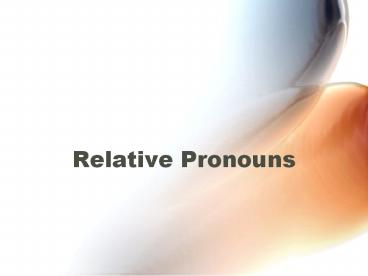Relative Pronouns - PowerPoint PPT Presentation
1 / 19
Title: Relative Pronouns
1
Relative Pronouns
2
Relative Pronouns
- Relative pronouns connect a independent and
dependent clause. - I bought the book that he is reading.
- Relative pronouns combine sentences to avoid
repetition. - I bought the book. He is reading the book.
- Relative pronouns are sometimes omitted in
English, but can never be in Spanish.
3
Que
- Que is the most frequently used relative pronoun.
It can be - the subject of the verb in a relative clause
- La mujer que escribió la carta es amiga mía.
- the object (like a DOP or IOP) of the verb in a
relative clause - El libro que Elena compró es muy caro.
4
Que
- the object of a preposition in a relative clause
- refering to only things
- Ése es el avión en que Pedro vino de Viena.
- refering to people only after de
- El joven de que hablaban es muy guapo.
5
Quien/quienes
- Quien and quienes (meaning who and whom) refer
only to people. - They are used primarily as the objects of
prepositions (especially a, con, de, and en). - Ésas son las chicas en quienes confié.
- Those are the girls in whom I confided.
6
Quien/quienes
- They are also used instead of que in relative
clauses which are separated by commas - the subject of a verb in the relative clause
- El autor, quien había escrito varios libros,
habló en la conferencia. - the object of a verb in the relative clause
- El estudiante a quien le dio malas notas estudió
más.
7
Quien/quienes
- When quien and quienes are the direct objects of
the verb in the clause - The personal a is required.
- Que can be used in place of a quien or
- a quienes
8
el/la/los/las que
- el/la/los/las que (meaning that, which, who,
whom) refer to persons and things - They can be used as the subject or object of the
verb in a regular clause. - Subject Conozco al profesor de María el que
vive cerca de la escuela. - Object Vio Ud. a las hermanas de Juan, a las
que invitamos a la fiesta?
9
el/la/los/las que
- el/la/los/las que are used after prepositions
(de, con, por, para, ect.) (especially those that
have more than one syllable) - Me gusta el parque cerca del (de el) que
comimos. - El profesor para el que escribí la composición es
muy exigente.
10
el/la/los/las que
- el/la/los/las que are the equivalent to the
English he/she/those/the one/ that/those who - Mi amiga Celia, la que juega al fútbol, acaba de
ganar la competencia.
11
el/la/los/las que
- When el/la/los/las que are used at the beginning
of the sentence, they are often replaced with
Quien/Quienes to mean an indefinite subject (aka
he who... Think proverbs) - Quien (El que) ríe último, ríe mejor.
- He who laughs last, laughs best.
12
el/la cual and los/las cuales
- el/la cual and los/las cuales mean the same as
el/la/los/las que. - They can also be used in the same ways. (see
previous slides)
13
el/la cual and los/las cuales
- In order to avoid confustion with porque, sin
que, and para que, use el/la cual and los/las
cuales in place of que, quien, and quienes with
the prepositions por, sin, and para. - El candidato por el cual voté ganó las
elecciones.
14
el/la cual and los/las cuales
- NOTE That el/la cual and los/las cuales CAN NOT
be used to replace quien and quienes to mean
he/she/the one(s), those who. - YOU CAN ONLY REPLACE WITH el/la/los/las que.
15
el/la cual and los/las cuales
- ALSO DO NOT use el/la cual and los/las cuales
when it is an antecedent (use examples to help). - Esta moto y la que compró mi hermano son
modernas. - Los que hablan español ganan mejor sueeldo.
16
Lo que
- Lo que is used to refer to an idea that has been
previously stated. - Tenemos tres exámenes hoy, lo que no me
gusta nada. - (refering to the fact that we have tests not
the tests themselves.) - Lo que can also refer to an idea that is not
stated but is understood and generally means
what. - Lo que te conté es verídico.
- What I told you is true.
17
Lo cual
- Lo cual ALSO is used to refer to an idea that has
been previously stated. - El presidente cambió de opinión varias veces,
lo cual (lo que) causó muchos comentaios de la
prensa. - When the idea has not been mentioned, ONLY USE lo
que. - Lo que él te dijo no es verdad.
18
Cuyo/cuya/cuyos/cuyas
- Cuyo/cuya/cuyos/cuyas are adjectives that mean
whose. - They are put in front of the noun and must agree.
(if they describe more than one noun, they ONLY
agree with the 1st.) - Ésa es la autora cuyos cuentos y novelas han
recibido muchos premios internacionales.
19
Cuyo/cuya/cuyos/cuyas
- When whose is used as an interrogative (aka
question word) Cuyo/cuya/cuyos/cuyas can NEVER BE
USED. - Always use De quién(es).































